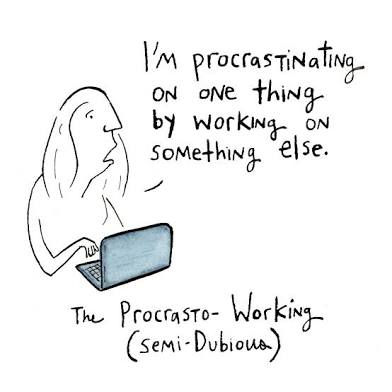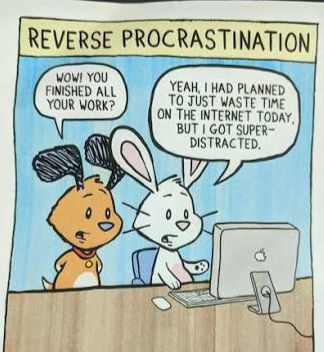Procrastination
- Jul 31, 2025
- 7 min read
Updated: Jan 4
************************
************************

What tasks do you usually put off the most? For me, it's the everyday stuff that often gets pushed aside, even though it's important. Here's a list of things I tend to avoid:
Dishes: I usually leave the dishes until I absolutely have to deal with them because the mess can be overwhelming.
Laundry: I let laundry pile up until I'm out of clean clothes, which just adds stress to the whole situation.
Charting: Filling out patient info is so boring that I keep putting it off.
School work: Back in school, I'd delay assignments and studying, leading to some pretty stressful late nights.
Making appointments: Scheduling appointments seems like such a hassle, so I end up delaying and missing out.
Cleaning the bathroom: Scrubbing the bathroom feels like a huge task, so I keep putting it off.
Cleaning the floor: I ignore the floors until they're really dirty because it's such a chore.
Contacting loved ones: Busy schedules mean I delay reaching out to friends and family, which makes me feel guilty.
To be continued……: This list isn't complete; there are plenty of tasks that I procrastinate on, which is something a lot of us deal with.
Figuring out why we procrastinate is the first step to beating it. By recognizing these tasks, we can come up with ways to turn procrastination into getting things done.
************************
So Many Appointments
************************

So, I finally got around to booking vet appointments for my pets after putting it off for way too long. Other stuff kept getting in the way, and their check-ups ended up being way overdue. One of my cats, Whiskers, had never even been to the vet, which made me realize how important these visits are for their health. It was kind of embarrassing to admit that setting up these appointments, which takes like two minutes, felt so overwhelming. I felt guilty for dragging my feet, knowing my pets depend on me for their care.
Thinking about it, I realized I need to step up my game as a pet owner. My pets deserve regular check-ups, and I should make their health a priority by finding a better way to keep track of their needs, like setting reminders. This means not just vet visits, but also keeping an eye on their diet, exercise, and mental stimulation. I really want to be more involved in their lives and give them the love and care they deserve.
From now on, I want to be more on top of things and organized when it comes to their care. I'm planning to set up a dedicated pet care calendar for appointments, vaccinations, grooming, and activities. Having a structured plan will be great for my pets and will help me stress less. This whole experience has been a wake-up call about being a responsible pet owner. My pets bring so much joy and companionship, and I'm committed to making sure they have healthy, happy lives. I'm ready to take on this responsibility with everything I've got.
************************
Now or Later, Here or There
************************

After dropping my daughter off at camp, I've got a packed day ahead with three patients, each needing something different from me. These appointments are super important for my job and for helping my patients out. Even though it’s tempting to just chill at home, I know putting off these appointments could mess up my day and interfere with my evening plans with my son. We've been looking forward to this coffee date for ages! I've learned from past procrastination that it can lead to rescheduling, and I really want to avoid that. Time’s tight, and patient visits often take longer than expected, which could cut into my time with my son.
I really value our coffee dates as a chance to bond and catch up. By focusing on my patients now, I can make sure I handle my responsibilities and keep my evening plans intact. My work is important, and each patient deserves my full attention. By juggling my time well, I can balance both my job and family commitments. After work, I can finally relax, kick back, and maybe do some writing, which is my creative escape.
In the end, my patients rely on me, and I need to put their needs first. If I procrastinate too much, it could mess up my schedule and affect them too. I’ve got to push past any hesitations, knowing that doing what I need to do will lead to more satisfaction, letting me enjoy the rest of my day with a clear mind and a happy heart.
************************
Just GO DO IT!
************************

Like right “meow”.
To dodge feeling guilty about not doing tasks right, I try to dive in with the right mindset and prep. By focusing on the journey instead of just the end result, I can enjoy the little details of each task and celebrate small wins, which keeps me motivated. Being scared of messing up can make me procrastinate, which only ramps up guilt and self-doubt. So, I break tasks into bite-sized pieces and stick to a plan, which helps me make fewer mistakes and feel more confident. Getting feedback from others gives me useful insights and reminds me I'm not in this alone. Setting realistic goals helps me embrace learning, and I see mistakes as chances to grow. This cuts down on guilt and helps me be kinder to myself.
By taking these steps, I create a positive vibe, free from guilt. Embracing ongoing improvement and reaching out for support makes tasks more fulfilling and productive. A growth mindset turns challenges into stepping stones, boosting my personal growth and well-being.
When I get home, I often just chill out and avoid tasks, which leads to stress and feeling overwhelmed. Tackling things bit by bit could ease this pressure. I've decided to break the habit of avoiding stuff by prioritizing tasks, setting specific times, and sticking to my plan.
************************
Yay For Not Procrastinating!
************************

I'm really thankful for the timing of when I got to my patient's house. The sun was setting beautifully, which was a stark contrast to the chaos inside. Her intense screams made me rush in, feeling a strong sense of urgency. When I walked in, I saw a staff member trying to help her amidst all the craziness. I went over calmly, wanting to create a vibe of safety and trust. My calm words and presence helped her settle down, and I could see her starting to relax. Her screams faded as she began to understand what was happening, and her breathing evened out.
There was a moment when she closed her eyes, showing she was exhausted but also finding a bit of peace. It really showed me how powerful compassion can be, and I felt good knowing I could provide some comfort. It was a big relief to see how much empathy could change things. After making sure she was okay, I headed home, feeling grateful for the difference I made and looking forward to spending time with my family. The whole experience reminded me how important it is to be there for people in tough times and how valuable human connection is. It also made me promise myself to keep being a steady support for anyone who needs it.
************************
If Not Now, Then When?
************************

I often find myself saying, "I'll do it tomorrow," as a way to dodge feeling tired and swamped with tasks. But putting things off just piles up my to-do list, pushing me to get moving right away. To break this habit, I set alarms on my phone to remind me to take action, hoping to set a good example for my kids. Back in nursing school, procrastination had me scrambling to meet deadlines, which made me super anxious. My teachers always stressed the importance of being diligent and responsible, but I sometimes let those slip. Looking back, I realize that tackling things earlier would have made my nursing school life easier and more engaging. This insight motivates me to be more disciplined, focusing on growth rather than stress.
************************
Lists
************************

************************
Lists
************************
Books 📚
More Books About Procrastination here
************************
Songs 🎤
************************
Movies/Shows/Documentaries 🍿
************************
Other People’s Stories about Procrastination 🫣
************************
Bible verses about procrastination ✝️
1 Corinthians 14:40 “But everything should be done in a fitting and orderly way.”
Ecclesiastes 9:10 “Whatever your hand finds to do, do it with all your might, for in the realm of the dead, where you are going, there is neither working nor planning nor knowledge nor wisdom.”
Ecclesiastes 11:4 “Whoever watches the wind will not plant; whoever looks at the clouds will not reap.”
Hebrews 12:11 “No discipline seems pleasant at the time, but painful. Later on, however, it produces a harvest of righteousness and peace for those who have been trained by it.”
James 4:17 “If anyone, then, knows the good they ought to do and doesn’t do it, it is sin for them.”

************************
Picture











Comments